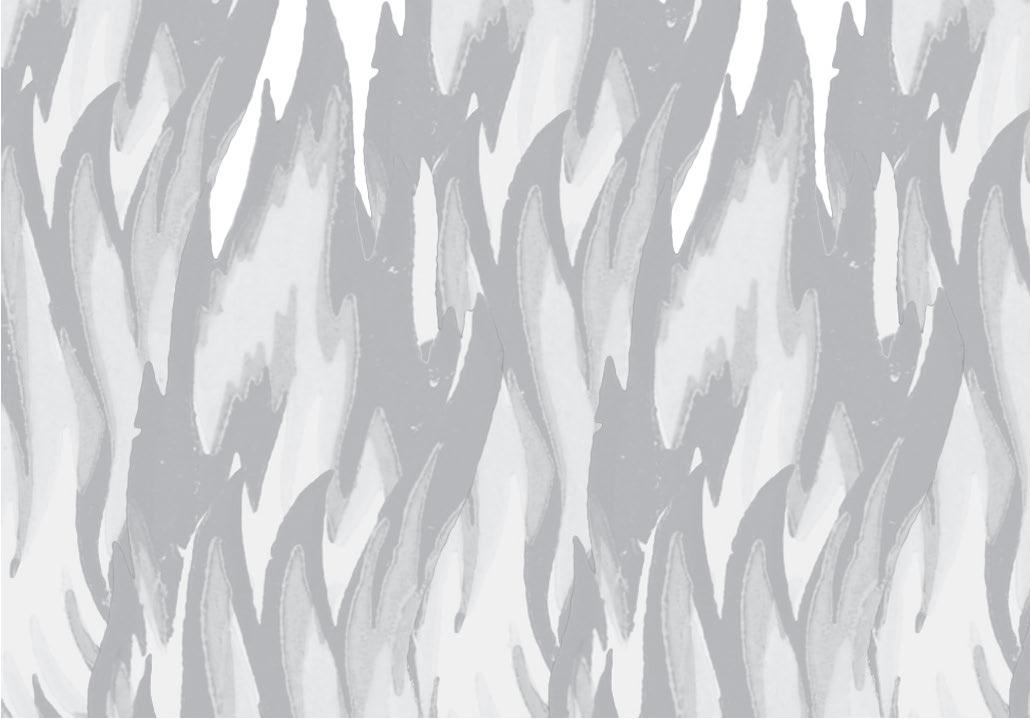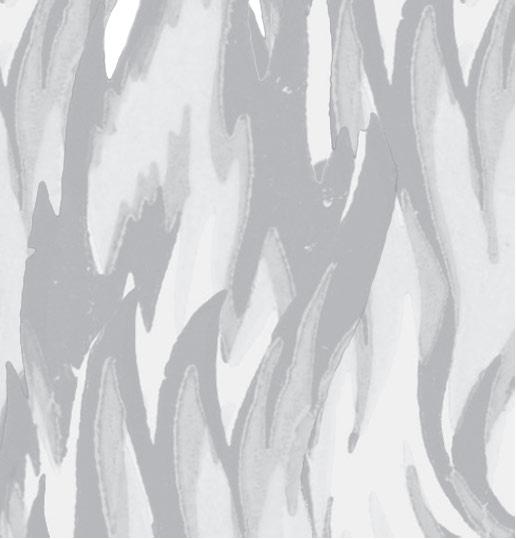Dare I Naomi Watts
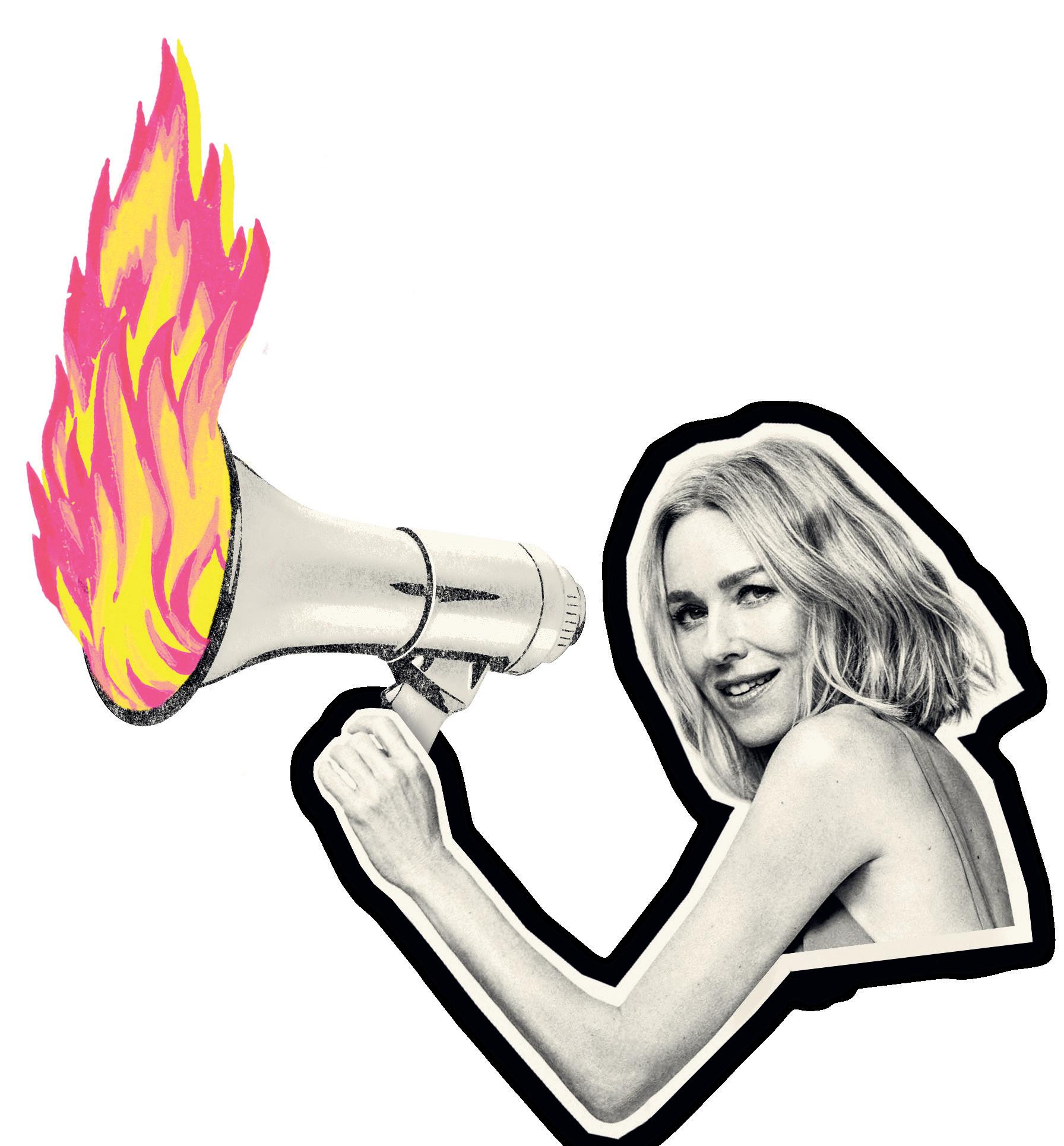






Vermilion/Happy Place Books, an imprint of Ebury Publishing
UK | USA | Canada | Ireland | Australia India | New Zealand | South Africa
Vermilion is part of the Penguin Random House group of companies whose addresses can be found at global.penguinrandomhouse.com
Penguin Random House UK
One Embassy Gardens, 8 Viaduct Gardens, London SW11 7BW penguin.co.uk global.penguinrandomhouse.com
First published in Great Britain by Vermilion in 2025
First published in the United States of America by Crown in 2025
Copyright © Naomi Watts 2025
Interior art credits: (megaphone) © Eleonora Galli/Getty Images; (flames) CSA Images/Getty Images
The moral right of the author has been asserted.
Penguin Random House values and supports copyright. Copyright fuels creativity, encourages diverse voices, promotes freedom of expression and supports a vibrant culture. Thank you for purchasing an authorised edition of this book and for respecting intellectual property laws by not reproducing, scanning or distributing any part of it by any means without permission. You are supporting authors and enabling Penguin Random House to continue to publish books for everyone. No part of this book may be used or reproduced in any manner for the purpose of training artificial intelligence technologies or systems. In accordance with Article 4(3) of the DSM Directive 2019/790, Penguin Random House expressly reserves this work from the text and data mining exception.
Typeset by Jouve (UK), Milton Keynes
Printed and bound in Great Britain by Clays Ltd, Elcograf S.p.A.
The authorised representative in the EEA is Penguin Random House Ireland, Morrison Chambers, 32 Nassau Street, Dublin D02 YH68
A CIP catalogue record for this book is available from the British Library
ISBN 9781785045462
Penguin Random House is committed to a sustainable future for our business, our readers and our planet. This book is made from Forest Stewardship Council® certified paper.
For the generations of women who’ve suffered in silence.
And for the next generations, may they suffer no more.
Foreword, by
Dr Mary Claire Haver
Introduction: What Is Menopause?
Why is menopause so confusing? How do we know if we’re in it? CHAPTER ONE Discomfort Zone
What are hot fl ashes? Why do I keep getting UTIs and migraines? Why am I having GI problems now on top of everything else? Whose body is this anyway?
Why was I blindsided by perimenopause? Can women still get pregnant later in life?
What happened to my libido? What can I do to enjoy sex more? Is “use it or lose it” real?
Why do I want to hide—my body, my desire, my feelings, and just about everything else?
Will I ever feel like myself again? Should I take antidepressants? Is it normal to be so anxious? Why do I want to throw something?
What is hormone therapy, and is taking it a good idea for me? What do menopause doctors mean when they talk about “the study”?
What should I know about delivery methods and dosages and how long to be on hormone
Is it brain fog or Alzheimer’s? How can I improve my memory?
Why is my skin so dry? Should I get Botox? Do I really need eighteen serums?
Why am I waking up all the time? What should I do about night sweats? Does alcohol really compromise sleep? Will I ever feel well rested again?
Do I have to wear sack dresses now? Can I just be “The Lady Who Gave Up”? What might make me feel better in my body?
How do I deal with ageism in the workplace? Is it time for a reinvention? How can I be brave when I feel so vulnerable?
CHAPTER THIRTEEN
Why am I gaining weight, and why in these places? What should I be eating to make this time of life better? I don’t have to give up everything fun to be healthy, do I?
What kind of exercise should I be doing? How important is strength training?
Should I have had kids/had more kids/not have had kids? How does one parent teenagers? Why am I so sad about the empty nest? What should I look for now in my romantic relationships and friendships?
CHAPTER SIXTEEN
What are the biggest health risks at this age? What tests should I be getting? How should I talk to my doctor about hormones and everything else?
CHAPTER SEVENTEEN
How can I fi nd meaning and give back? What’s the good news?
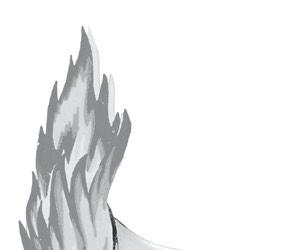
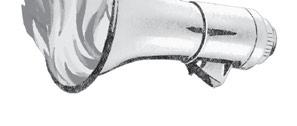
by Dr Mary Claire Haver
I first met Naomi Watts when I was invited as a medical expert to collaborate on the launch of Stripes Beauty, her company offering products and education to support women during menopause. At the time, I had been exclusively treating menopausal patients out of my own clinic for about eighteen months. I’d become aware that women were increasingly seeking out self-care treatments to address the distinct changes they were noticing in their bodies. I had always admired Naomi’s work as an actor, and I was intrigued by her idea to help address the needs of her contemporaries. And now I am honored to introduce you to her marvelous and important book!
In person, I’ve found her to be wonderfully open to sharing her own story of early menopause and fertility challenges. These experiences fueled her desire to build a community so that other women need not be blindsided by such experiences. She believes, as do I, that we shouldn’t be left helpless in dealing with the challenges of the menopausal transition. I’ve always appreciated the fact that she wasn’t interested in selling menopause “cures” (which don’t exist), and instead was focused on conveying whatever
information she’s found useful herself and compassionately supporting other women.
When, in 2022, Naomi began collaborating on menopause symposiums with The Swell, a midlife community designed to help women reimagine how they age, I was thrilled to connect in person with an eager and interested audience of menopausal women. These gatherings also helped me learn a tremendous amount about myself, granted me access to advancements in science and menopause care, and led me to a tribe of like-minded physicians—now known as “the menoposse”—who are revolutionizing how we treat, study, and conceptualize menopause.
The movement to overhaul menopause gained momentum thanks in large part to women like Naomi who were brave enough to stand up and say, “I’m no longer going to be silent about my experience.” For her, speaking out as a famous Hollywood actress had the additional risk of being ostracized by the entertainment industry, a space that routinely shelves women who are open about the complexities of aging while female. But it had the additional benefit, for us, of using her glamour to help remove the stigma around menopause, and even making it seem cool.
For many women, the menopausal transition and menopause itself bring about unexpected changes to everything from skin tone and hair quality to sexual health to matters of mood and memory. What the woman in mid- (and mid-ish) life needs when facing these issues is support, which may come in the form of a doctor who finally listens or a friend who’s going through the same thing. By being honest about her own and her friends’ experiences in dealing with the shock of menopause, Naomi offers validation to other women and makes them feel less alone.
But she goes even further in her effort to help. For Dare I Say It, Naomi consulted a number of the top menopause experts in the country. Their clinical perspectives smartly support the lived experiences of women in the menopausal transition and provide practical advice, too.
For years, Naomi has been sharing her story and her knowledge
in symposia and among peers. With Dare I Say It, her bravery, honesty, and humor will provide much-needed solace and encouragement to an even wider circle. I applaud Naomi dedicating these pages to such a candid telling of her own experience and to sharing so much profound wisdom and useful guidance. Th is is a great gift to the community of menopause education!


“Looks like you’re close to menopause,” my doctor told me when I was thirty-six and wondering why I was having so much trouble getting pregnant.
I almost fell off the examination table.
“What do you mean?” I said, gasping for air. “Close to menopause? That’s for grandmothers! I’m not even a mother yet! And, by the way, that’s what I’m here for, to become a mother! Take it back!” I was trying to joke, but really I was begging him to make it not be true. I was so scared that this would be the end of my dream to bear children.
As I sat there stunned and full of self-recrimination, I remembered that my mother had once mentioned she’d hit menopause at forty-five—but forty-five still felt very far away from thirty-six. And, frankly, I didn’t even really know what menopause meant— except very likely the conclusion of my acting career, which got underway far later than most. When I’d hit my early thirties, people had started telling me that the time would soon come when I wouldn’t be able to play a leading lady anymore. Was this the end that had been foretold? I begged the doctor for more information. He explained that technically menopause is a single day, when
you’ve gone one full year since your last period. This happens on average at the age of fi fty-one, and for years leading up to menopause— in the phase now known as “perimenopause”—you can experience a host of symptoms connected with declining estrogen: night sweats, unpredictable periods, mood swings, and weight gain being among the most common. (Shoutout to the relatively recent rise in the use of the term “perimenopause,” which according to the OED entered the lexicon in the early 1930s; “menopause” was named way back in 1821 by a French doctor named Charles-Pierre-Louis de Gardanne; it was about time for an expansion of our vocabulary!)
I’d been having night sweats for a while, but no doctors— and I’d seen plenty of doctors, because you have to get a physical exam every time you start a new fi lm—had ever made much of them. You know when you go to a doctor’s office and you get the lists with a hundred questions? I ticked “night sweats” every time, for years. Each time they were chalked up to stress, or premenstrual syndrome, or an allergic reaction to something I ate or drank— maybe sulfites in wine? And I accepted those explanations. I was often tired or stressed out from demanding shooting schedules or international travel for press junkets.
In my midthirties, my periods started coming close together, sometimes every fi fteen to eighteen days. I thought that seemed weird. Still, it never occurred to me that it had anything to do with menopause. But now, sitting there in the doctor’s office, I was learning that my irregular periods and night sweats had actually been perimenopausal symptoms, and their cause was not the stress of my overnight shooting schedule or an extra glass of wine with dinner.
The news sank in as I walked out: my periods would be stopping soon, and with them would go any hope of pregnancy. I imagined calling my mother. I’d begin the conversation in a sensitive, loving way, full of warmth and compassion for what she’d endured as a woman of her generation: “What the hell, Mum?” Why hadn’t she told me more about this inevitable transition?
Eventually, I did get the chance to ask her about how it had been for her.
“My periods fizzled out,” she said. “I was emotionally up and down for a long time, had a few years of symptoms, but after fortyfive, the periods were all gone, and that was that!”
I expressed shock that I’d gotten so far in life without knowing about any of that.
“I guess these were the conversations I didn’t have with you because my mother never had them with me,” she said. How absurd that something so common should be so taboo. And why had I, a relatively worldly person who’d been going to my annual exams and hanging out with the most wonderfully open and fiercely intelligent women my whole life, never once heard “Heads up, here are the details about this thing that’s going to happen to you at some point in the coming years and what it might be like”?
Could it be that one reason for the silence around menopause is that women feel like things are just supposed to hurt?
Dr. Sharon Malone, a D.C.-based ob-gyn, chief medical officer at Alloy Women’s Health and one of the leading menopause practitioners in the country, told me, “I think one of the things that we have got to understand, and study after study has substantiated this, is that we have really normalized suffering as part of womanhood. We suffer from cramps, we suffer in childbirth, we suffer from premenstrual syndrome. These things that exclusively affect women have been understudied across the board. Because the expectation is that women suffer, it is not deemed worthy of redress. Women exaggerate. We’re hysterical. It’s all in your head. Th is unfortunate perception is still all too common in medicine today. Women still feel they’re not heard, they’re not seen, and they’re not believed. And that’s the problem.”
The new menopause awareness is helping women get better treatment, but there’s still a lot of misinformation out there, and it can be staggering. A few years ago, my children heard me talking about how I was in menopause. I was curious to hear what they’d
absorbed about this life stage, so I asked them what they knew. Would they have something to say about making the transition into a powerful new phase of life, about the wise, grounded elders of ancient villages, about how Helen Mirren didn’t get famous until she was well into middle age?
“Isn’t it when you wet the bed?” said one child.
“It’s when old ladies die?” guessed the other child. “Are you dying?”
“No!” I said. Then I thought, I guess we’re all dying, aren’t we? And I started digging myself a hole: “Well, yes, but no, but . . .”
If the story of our fertile lives is an adventure that starts in puberty and ends in menopause, why do so few people talk about the ending to that odyssey and what comes next? Why isn’t menopause part of sex education or premarital counseling or any of the conversations preparing us for the coming challenges in life? Even just a quick FYI when you get your fi rst period: “Congratulations! You’re starting a journey of fertility during which you may or may not conceive children. Fertility peaks in your twenties and then starts to decline, more rapidly after the age of thirty-five. Your cycle ends on average at fi fty-one, maybe much earlier. Be prepared.”
So many doctors have since told me that there’s an epidemic of misdiagnosing women with everything from fibromyalgia to chronic fatigue to irritable bowel syndrome to clinical depression when, in fact, they were just perimenopausal.
Years ago, I found myself trying to explain all this to a younger friend. With the passion of Cassandra, I warned her not to ignore symptoms or minimize issues with her health, and to rule out menopause before pursuing more obscure tests.
“It’s crazy that there’s so little information out there!” I ranted to her. “Why do we have to feel like it has to be a secret? Why don’t we share everything we’ve figured out ourselves and find out what worked for other people? Why isn’t there some kind of manual?”
“I’d read a book on that,” she said. “You should write it.”
I resisted her advice for a long time. My fear was too great. Besides, I still knew nothing—just that it was fast approaching, and I
was shit scared. I’d been warned ever since I started acting that calling attention to your age—when that age was not twenty-three or younger—would be career suicide. I was told I would never work again if I admitted to being menopausal, or even perimenopausal. Hollywood’s lovely term for such women was “unfuckable.”
Each year, two million American women enter menopause. That’s almost six thousand women a day. We’re talking a billion menopausal women worldwide. And yet, I felt completely alone. Ignorance of this transition led to shame and fear, and it almost cost me my chance to become a mother. The fact was I’d been showing perimenopause symptoms for some time but had never been told that’s what they could be. When a woman comes in complaining of symptoms like night sweats, anxiety, and insomnia, that should be a doctor’s cue to make sure she knows the facts about perimenopause and menopause.
I mean, I partly get the doctors’ reluctance to open that conversation. After a few years of being in this space and speaking to them one-on-one, I’ve come to understand how little time they have to strike up a hard conversation. If they have only fi fteen minutes with a patient, why would they want to drop a bomb? Surely the messenger would be killed. I would have slapped my own doctor if he hadn’t been so bloody handsome! Why not just do the Pap smear or blood test, and if the woman’s distraught, hand her a script for an antidepressant or sleeping pill? Punt the menopause conversation to another day and, with any luck, to another doctor!
There’s no question that women in their forties and fi fties have been gaslit by the medical system, with real consequences to their well-being, even if there’s now a welcome pendulum swing toward more attention to menopause and to various forms of symptom relief. And relief is possible! I’ll talk about how hormone replacement therapy (also known as HRT, or menopause hormone therapy [MHT], or just hormone therapy [HT]) has helped me, and what questions to ask if you’re considering it. I’ll use HRT here because that’s how it was introduced to me, and I’ve stuck with it.
I think it’s worth considering where the long silence came from.
Might it not have something to do with misogyny, the patriarchy, and ageism? And with our desire not to inconvenience anybody? But why did we women think that should be the goal—to never need any help?
How radical it has been to realize the ways in which I’d silenced myself because of sexism. I’ve realized that we don’t need to people-please. We don’t have to make things easy for everyone else at every turn. We can take up space. We can say what we need. We can assert ourselves!
I’ve also come to believe that there is nothing sexier than a woman who knows what she wants. All good relationships at work and at home— and at the doctor’s office—require communication. We can discuss without shame the details of menopause—how to navigate it, what the symptoms could be, and not just “Oh, you might feel warm at some point.” But all the gory details. I didn’t know my skin would get so dry, or that urinary tract infections and GI issues would become commonplace, or that there was such a long list of other issues connected to the menopausal transition. I was craving information on menopause, and certainly no one in Holly wood was breathing a word about it. We were all behaving as if between the seductress years and the grandmother roles, women just . . . I don’t know, vanished?
Well, I got madder and madder until I no longer cared about the potential cost to my career. Hell, if I needed information, others probably did, too. And by that point I’d been dealing with menopause for a decade, so I thought that maybe—just maybe—I could offer something to those coming to it fresh.
In October 2022, I founded a company called Stripes Beauty to address various practical needs of women my age (for example, by offering a lubricant “play oil” and an intensive skin moisturizer to help with the massive hydration loss that comes with middle age). Stripes Beauty’s three pillars are menopause education, community, and solutions from scalp to vag. In the same spirit, I started working on this book, which will attempt to cover every aspect of
menopause I’ve encountered. It’s intended to be the sort of resource I wish I’d had when I walked out of that doctor’s office in pieces and truly terrified.
I’ve written this book for anyone who’s going through menopause and trying to figure out what the hell is happening and for everyone who will go through it and wants to be well prepared so that they’re not blindsided like I was. I’ve always shied away from jumping on the soapbox. But the menopause conversation requires us to get honest, loud, and, dare I say it, even a little unladylike. Faaaaark!
One of the funniest things that’s happened as a result: random celebrities now text me regularly to tell me they’re in menopause. It’s like I’m behind the confessional window, or I’m Hollywood’s agony aunt. But I enjoy it! I welcome them to the club and offer them doctor suggestions or whatever they’re looking for, which is often just someone to listen to them without judgment. In this book I’ll tell you everything I tell them and in what I hope is enough detail to spare you all the searching I had to do as I was flailing my way through this transition.
Caveat: I’m not a doctor (I’ve never even really played one in movies, though I played a midwife once), but I’ve come to know plenty of them since I started banging on about menopause. I’ve always considered myself someone who’s good at putting people together, whether that’s throwing a dinner party, producing a fi lm, or organizing a pickleball tournament (yes, I’ve done that). I trust my instincts when it comes to identifying talented people. And so that is what I have done here. To offer the most up-todate information and the most inspiring stories, I’ve assembled brilliant experts— gynecologists, psychologists, dermatologists— and a diverse group of fascinating women with stories to tell about menopause, from a friend of mine in her seventies having the best sex of her life to a woman in her late forties who had a panic attack live on television.
How do we make this the most empowering, exciting time of
our lives as women? Th is is when we have the experience in our work, in our relationships, and in our bodies to know what we have to offer the world. We don’t need anyone else’s permission. All we need are the tools and the information to unapologetically stride into the powerful, joyful age ahead of us.


